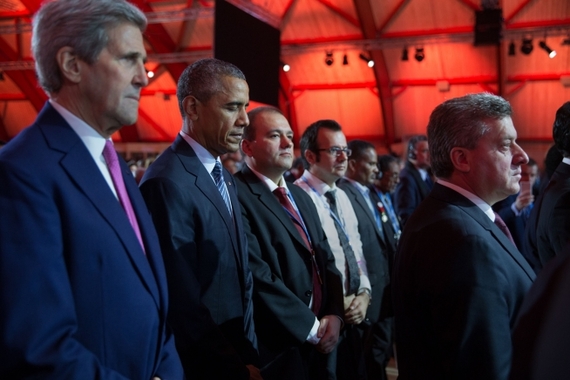A leading presidential candidate recently dismissed the threat of climate change by saying, "I think our biggest form of climate change we should worry about is nuclear weapons." It was a nonsensical comment, as if the reality of one serious danger meant we shouldn't worry about another. Sort of like deciding to ignore the risk of cancer because heart attacks exist.
It's a silly statement, but it represents a school of thought that climate change isn't a serious issue when compared to more traditional concerns, particularly on foreign policy. Even some who accept the reality of climate science see the impacts as distant and manageable, especially when compared to "serious" national security threats like terrorism and war.
The danger of this false choice was made clear by a stark and sobering comment made by President Obama in a wide-ranging series of interviews on international policy with Jeffery Goldberg of Atlantic Magazine. Asked about the threats that concern him the most, the President said:
As I survey the next 20 years, climate change worries me profoundly because of the effects that it has on all the other problems that we face," he said. "If you start seeing more severe drought; more significant famine; more displacement from the Indian subcontinent and coastal regions in Africa and Asia; the continuing problems of scarcity, refugees, poverty, disease--this makes every other problem we've got worse. That's above and beyond just the existential issues of a planet that starts getting into a bad feedback loop.
The President's message was clear: far from being an unimportant side issue in a world of serious threats, climate change is a contributing factor to many of the most dangerous challenges we face. And that will only increase along with global average temperatures.
History has repeatedly demonstrated that conflicts can arise from changing climatic conditions, population movements, and agricultural disruption. There are other important causes -- religion, nationalism, ideology, conquest, to name a few - but to ignore these economic catalysts is dangerously short-sighted.
Environmentalists have long made the case about the connection between global stability and climate action. But coming from us the argument sounds, to some, like a justification for action on an issue we care about for other reasons. So if you're skeptical, read this report by national security experts and military leaders - from President Bush's Secretary of Homeland Security to the former Commandant of the Marine Corps -- who make the same point as the President. Or read the Defense Department's Quadrennial Defense Review on the subject.
Climate change is a threat for all the reasons most often cited, from sea level rise to more extreme weather to the spread of insect-borne disease. It's a danger to our economy, with costs in the trillions according to Citibank estimates. But some of the most ominous impacts will be geopolitical. Those who care about not leaving a world more prone to war and terror to our children must take climate change seriously.
Official White House Photo by Pete Souza
On Twitter @RealKeithGaby

